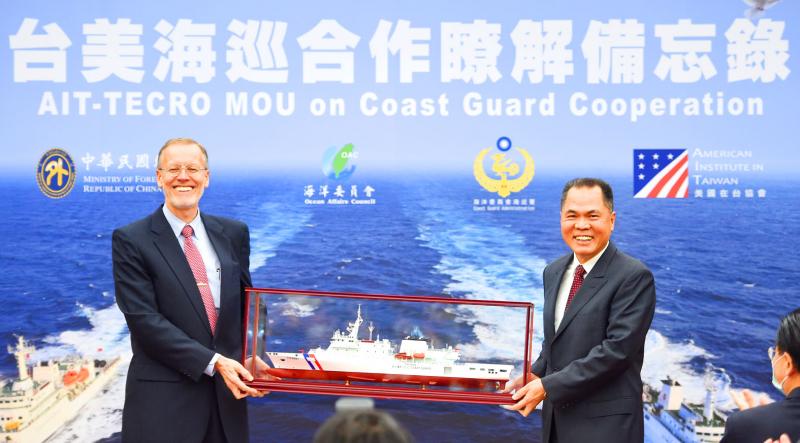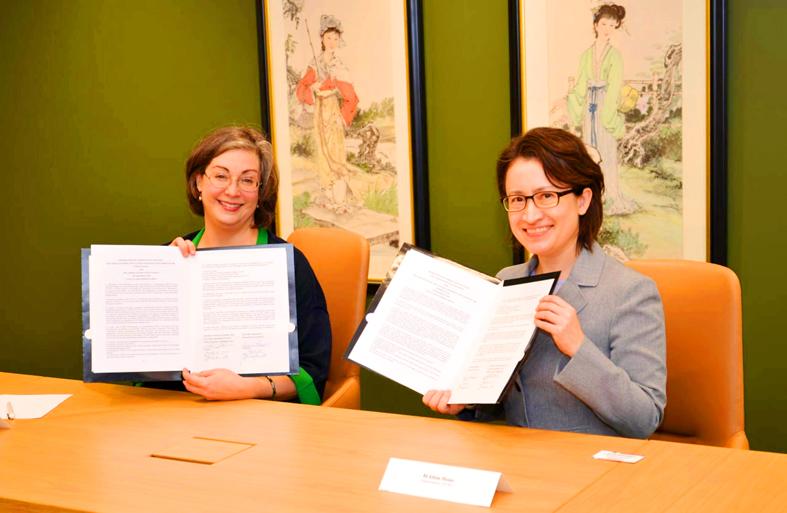Taiwan and the US on Thursday signed a memorandum of understanding (MOU) to establish a coast guard working group, the first official document inked by the two nations since US President Joe Biden took office in January.
The memorandum was signed by American Institute in Taiwan (AIT) Managing Director Ingrid Larson and Representative to the US Hsiao Bi-khim (蕭美琴) in Washington.
The memorandum “affirms a relationship with the common objectives of preserving maritime resources; reducing illegal, unreported, and unregulated fishing; and participating in joint maritime search and rescue as well as maritime environmental response events,” the AIT said in a news statement yesterday.

Photo: Liu Hsin-de, Taipei Times
“The United States supports Taiwan’s meaningful participation and contributions to issues of global concern, including in maritime security and safety, and in building networks to facilitate maritime law enforcement information exchange and international cooperation,” it said.
Based on the document, the two sides would establish a working group between Taiwan’s Coast Guard Administration (CGA) and the US Coast Guard (USCG) for communication and information sharing, and to build a stronger partnership on maritime rescue missions and maritime law enforcement, President Tsai Ing-wen (蔡英文) wrote on Facebook yesterday.
“We are of a maritime country, and ocean is inscribed in the DNA of Taiwanese,” Tsai said.

Photo courtesy of the Taipei Economic and Cultural Representative Office via CNA
As a responsible stakeholder of the Indo-Pacific region, Taiwan is willing to make more contributions in maritime affairs, and aims to defend a free and open Indo-Pacific region, she said.
Minister of Foreign Affairs Joseph Wu (吳釗燮) yesterday afternoon hosted a news conference in Taipei marking the signing of the document.
The signing of the memorandum shows that bilateral relations are “rock solid” and that there was no transition period to the new US administration, he said.
Connected to the world by ocean, Taiwan is committed to defending freedom, democracy and human rights with the US and other like-minded partners, he said, adding that the nation hopes to expand maritime cooperation with other countries as well.
“This MOU formalizes our already robust and longstanding cooperation with Taiwan’s coast guard,” AIT Director Brent Christensen said, describing Taiwan’s coast guard as “highly versatile in a variety of skills.”
Taiwan’s coast guard regularly takes part in training exercises at the US Coast Guard Academy, and it also invites USCG members to visit Taiwan to increase bilateral interactions, CGA Director-General Chou Mei-wu (周美伍) said.
Trained as a navy officer, Chou served as National Security Bureau special correspondent in Washington before he assumed his current position in January.
The CGA has been working to increase the coast guard’s capabilities to enforce maritime law and defend local fishers’ rights, Chou said, expressing the hope to work with more allies to defend stability in the region.
At the end of the news conference, Chou presented to Christensen a model of the new 4,000-tonne frigate Chiayi, which bears the name “Taiwan” in addition to the “Republic of China (ROC),” as instructed by Tsai.
The news conference was also attended by Japanese Representative to Taiwan Hiroyasu Izumi, British Representative to Taiwan John Dennis and Canadian Representative to Taiwan Jordan Reeves, as well as other foreign envoys.

SECURITY: As China is ‘reshaping’ Hong Kong’s population, Taiwan must raise the eligibility threshold for applications from Hong Kongers, Chiu Chui-cheng said When Hong Kong and Macau citizens apply for residency in Taiwan, it would be under a new category that includes a “national security observation period,” Mainland Affairs Council (MAC) Minister Chiu Chui-cheng (邱垂正) said yesterday. President William Lai (賴清德) on March 13 announced 17 strategies to counter China’s aggression toward Taiwan, including incorporating national security considerations into the review process for residency applications from Hong Kong and Macau citizens. The situation in Hong Kong is constantly changing, Chiu said to media yesterday on the sidelines of the Taipei Technology Run hosted by the Taipei Neihu Technology Park Development Association. With

CARROT AND STICK: While unrelenting in its military threats, China attracted nearly 40,000 Taiwanese to over 400 business events last year Nearly 40,000 Taiwanese last year joined industry events in China, such as conferences and trade fairs, supported by the Chinese government, a study showed yesterday, as Beijing ramps up a charm offensive toward Taipei alongside military pressure. China has long taken a carrot-and-stick approach to Taiwan, threatening it with the prospect of military action while reaching out to those it believes are amenable to Beijing’s point of view. Taiwanese security officials are wary of what they see as Beijing’s influence campaigns to sway public opinion after Taipei and Beijing gradually resumed travel links halted by the COVID-19 pandemic, but the scale of

A US Marine Corps regiment equipped with Naval Strike Missiles (NSM) is set to participate in the upcoming Balikatan 25 exercise in the Luzon Strait, marking the system’s first-ever deployment in the Philippines. US and Philippine officials have separately confirmed that the Navy Marine Expeditionary Ship Interdiction System (NMESIS) — the mobile launch platform for the Naval Strike Missile — would take part in the joint exercise. The missiles are being deployed to “a strategic first island chain chokepoint” in the waters between Taiwan proper and the Philippines, US-based Naval News reported. “The Luzon Strait and Bashi Channel represent a critical access

Pope Francis is be laid to rest on Saturday after lying in state for three days in St Peter’s Basilica, where the faithful are expected to flock to pay their respects to history’s first Latin American pontiff. The cardinals met yesterday in the Vatican’s synod hall to chart the next steps before a conclave begins to choose Francis’ successor, as condolences poured in from around the world. According to current norms, the conclave must begin between May 5 and 10. The cardinals set the funeral for Saturday at 10am in St Peter’s Square, to be celebrated by the dean of the College